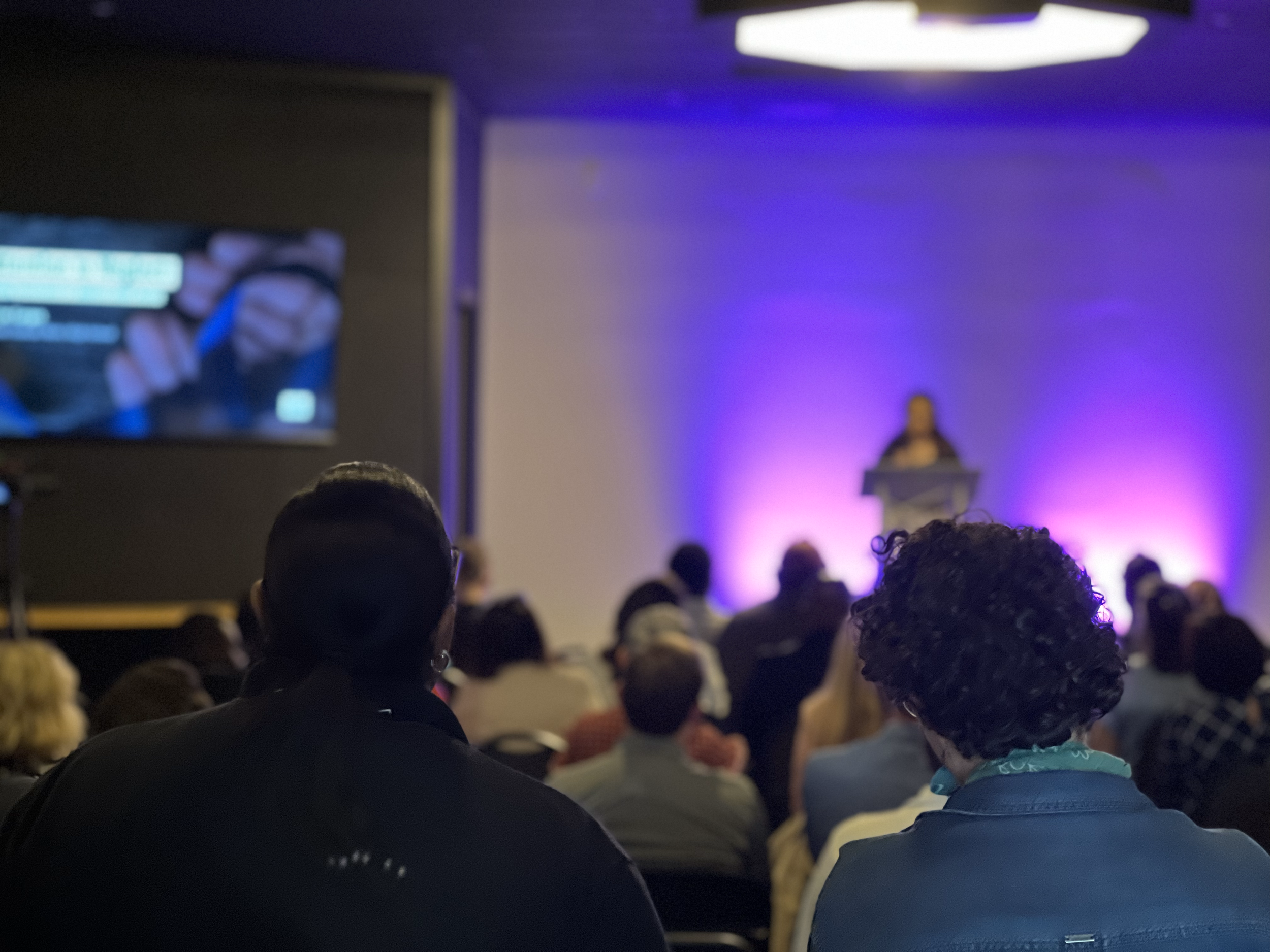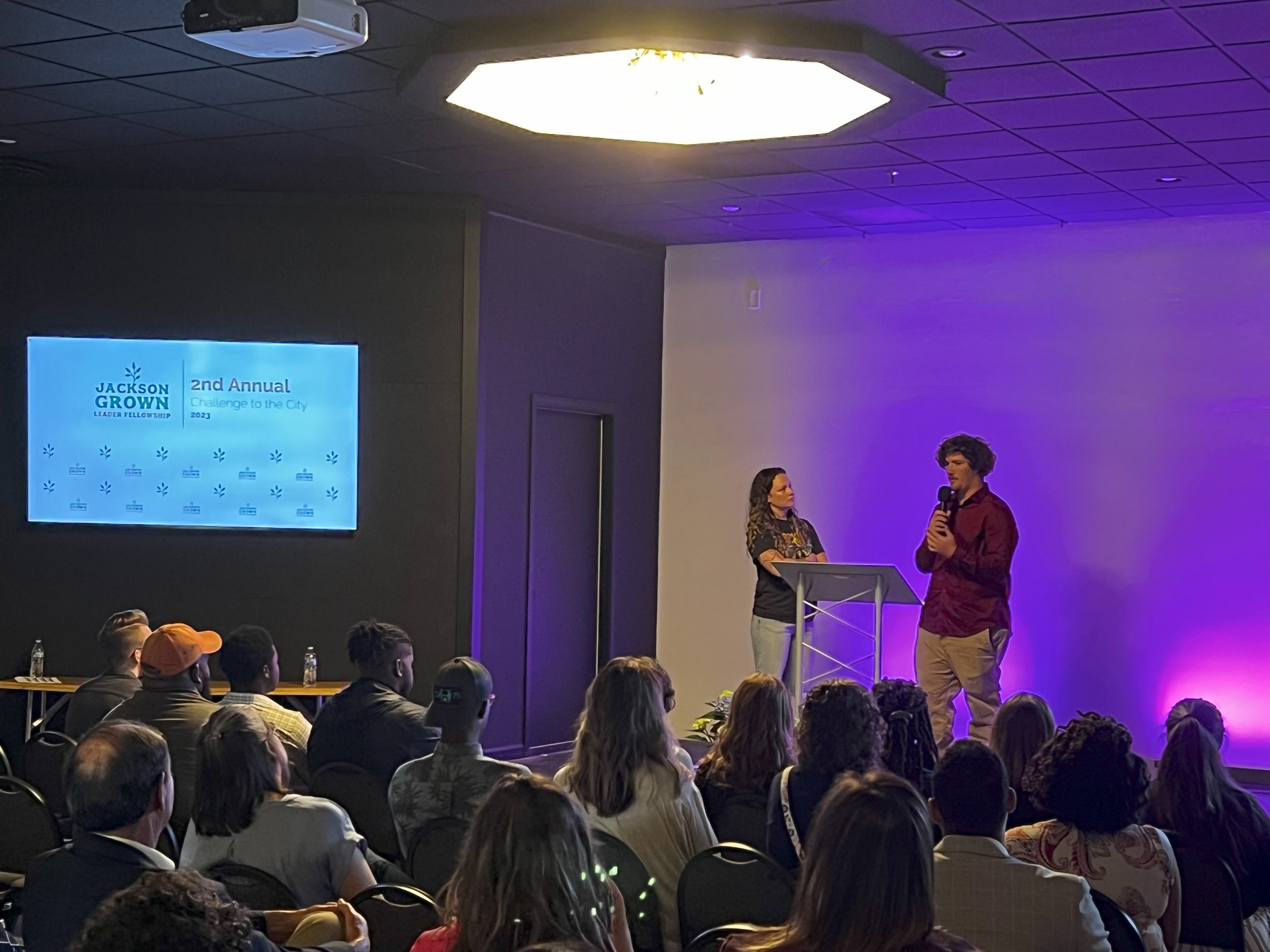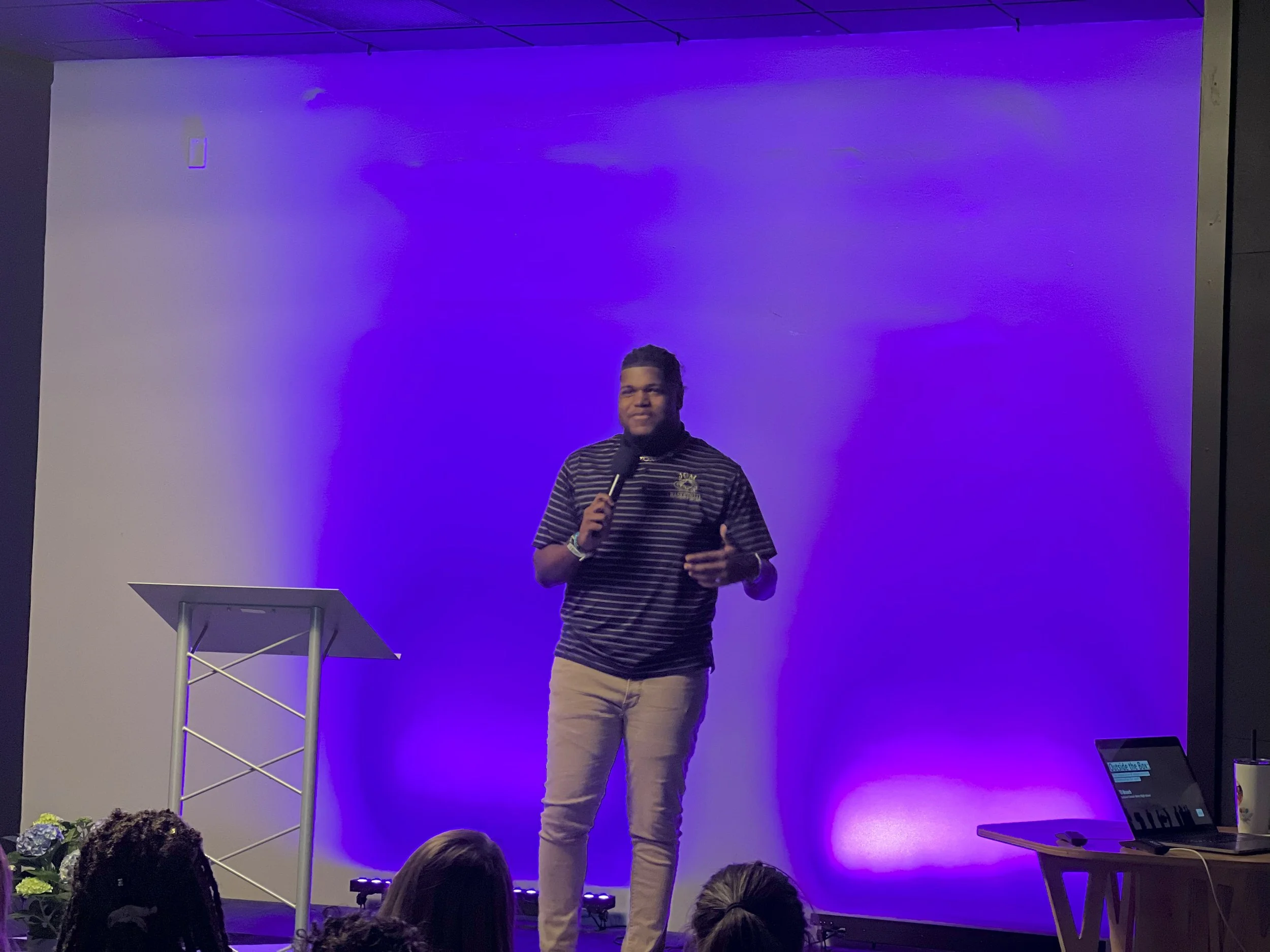Understanding Leadership
BY JON MARK WALLS
Kalin Earnest, a Junior Jackson Grown Leader Fellow representing South Side High School delivers a moving speech on the topic of sexual harassment. (Photo Credit Hannah Gore)
We were hidden. Tucked away in the center of London in a non-descript government building, hundreds of people were doing thousands of things around us. In the previous 72 hours I had called in sick twice to my (other) day job. I had spent a thousand dollars of my personal money on flights for colleagues and flown across Europe to the United Kingdom which was in the middle of a once-in-a-generation political crisis. Somehow, we had managed to organize a meeting with the two people in charge of communicating one of the British government’s most important messages since WWII. And, they didn’t know how to do it.
The Head of Communications for the Office of the Prime Minister of the United Kingdom and the Downing Street Director of Communications (equivalent to the President and the White House) were trying to find the best way to convince the British people why the country should remain part of the European Union.
My team and I were as nervous as they were. Our startup tech company was coming to the end of its investment runway. We were out of cash. Their country was nearing a potentially catastrophic economic and political cliff. All of us were fighting for our jobs.
Prime Minister David Cameron and his communications teams had three months to convince voters in a country of 65 million people not to leave the security of the third-largest economic area in the world. We had thirty minutes to convince them that we could help them do it.
Isaiah Meeks, a Senior Jackson Grown Leader Fellow from North Side High School speaks on the issue of providing better, safer spaces for youth to spend time outside of school.
“What makes a person worth listening to?”
Madelyn Tyler, Junior Jackson Grown Leader Fellow at North Side High School, dug into the challenges of poverty and what it meant for students in the Jackson Madison County School System.
What makes a person worth listening to? Does it require, as Malcolm Gladwell proposed, 10,000 hours of practice to become an expert? Knowledge certainly plays an important role. It allows a person to compare contexts and analyze trends. Networks of expert connections contribute to a person’s perspectives. They can play a valuable role in sparking a process or making that process go quicker. One might argue, though, the higher levels of practice, knowledge and networks a person develops, the more removed a person can be from the humility that can bind them. It can also hinder that person’s willingness to receive information from others who, by all apparent measures, have less.
In a war, should a general overseeing a war strategy meet with the lieutenants managing a battle? Perhaps. What about the privates fighting it? One could argue the privates see and feel what the higher ranking officers don’t and, many times, can’t. Certainly a CEO needs to have dinner with her investors and speak at business schools. She must do so to comfort those on the inside and recruit the best of those on the outside. If however, in the elevator that CEO doesn’t take a moment to stop scrolling emails and ask the plumber how things are going, could she miss gaining valuable insight into the factory’s aging infrastructure?
“One might argue the higher levels of practice, knowledge and networks a person develops, the more removed a person could be from the humility that can bind them.”
Amber Murphy, Junior Jackson Grown Leader Fellow from JCM-Early College High delivers a moving speech challenging the community to increase attention to anxiety and stress among youth.
On May 12th, 2023 at the 2nd Annual Challenge to the City, seventy-five senior leaders from across Jackson and Madison County walked through the conference room doors at theCO. Representing business, government, healthcare, universities, and non-profit organizations, these leaders took a seat and listened to Jackson Grown Leader Fellows speak on issues which they had seen and experienced in their lives.
Topics ranged from mental health and drug abuse to the complexities around poverty, abuse, and harassment. Fellows highlighted the importance of safe spaces for youth, growing opportunities for students and continuing to invest in the community’s parks.
The Fellows had spent the previous eight months identifying issues in the community which they had encountered and wanted to address. With the guidance of skilled mentors, they explored the topics and deconstructed the challenges they observed.
Andrew Ellis, Junior Jackson Grown Leader Fellow representing Madison Academic High School provides new, unique insight on the differences between perceptions and actual experiences of Jackson’s youth at public parks.
Multiple Fellows carried out surveys to gain insight from their peers on the issues they studied. In March, the Fellows met one-on-one with experts holding knowledge in their chosen areas. The Fellows were also coached by singers, songwriters, speechwriters and journalists on communication, public speaking, and stage presence.
Most importantly, though, it was the Fellows’ firsthand experience which anchored the speeches. Each experience was a starting point for their research, interviews, and reflection over the previous eight months. In response they asked for acknowledgement, consideration, reflection and, potentially, a response.
For those present, the issues and components of issues included known knowns, known unknowns and unknown unknowns. Issues were complex, the nuances of which can potentially be missed during a busy day or a hectic week or hard year by those in current senior leadership roles. Though in no way small or insignificant, these are issues and insights which may not immediately impact on an election or quarterly report. They may not warrant enough clicks in a local news cycle or likes on a social media post to justify a slot in one’s calendar or feed. They may come with a taco, a slider and a cup of coffee* as opposed to a steak and glass of wine. The insights may, however, serve (or one day save) a government, company or organization in unforeseen, currently unknowable ways.
Jocelyn Gargus, Senior Jackson Grown Leader Fellow from Jackson Central-Merry High School communicates a powerful message on the need to improve awareness of child abuse.
There was no reason why we should have been given that meeting in mid-March 2016. By no measure of a human resource officer were we qualified. Like any startup (or anyone), we were trying to fake it until we made it. I was the only one on the team of ten who had ever worked for a government…and it wasn’t even my own government. Everyone was sleeping on couches and eating out of cans. None of our suits had been washed in well over a month. We were on our last leg. But there we were, sitting in front of people who helped a Prime Minister prepare for weekly meetings with the Queen of England.
At that point, three months before the historic Brexit vote, the British Prime Minister’s communications team was debating two options: Option 1 send a fourteen-page brochure to each of the 25 million homes in the United Kingdom at a cost of 50 cents per brochure or Option 2 use an online platform like ours to manage questions and concerns from British citizens about the country’s potential decision.
Though we didn’t know much about much, we had spent the previous three and a half years studying global political communication trends and launching our tech platform across the European Union, the very institution the Prime Minister was trying to stick with. For this, our outsider perspective and lack of traditional experience were valuable.
We knew one thing: people wanted to feel like they were being listened to. Like a Chinese finger trap, success depended on going deeper instead of finding excuses to pull away from hard conversations.
It was a choice between speaking to or speaking with.
Gavin Slaugher, Senior Jackson Grown Leader Fellow from Madison Academic High School, speaks on the complexity and interconeectedness of mental illness and drug abuse.
For any person in a position of significant leadership these are regular choices. Listening, like a concert, can potentially be viewed as a luxury. In some cases, the higher one climbs up the social or career ladder, the longer the speaker’s bio needs to be to warrant the calendar reservation. Listening must come with a post-worthy photo op, all the better if it is signed and framed.
The 2nd Annual Challenge to the City, however, demonstrated a unique and rare exchange of firsthand experiences, deep knowledge sets, refined skills, and valuable networks at all levels of the Jackson leadership community. Importantly, across the group, these components were bound by the assumption that each person could learn something from the other. It was an enviable combination of experience, knowledge, skills, networks, and humility. It is leadership.
“Our argument was grounded on two ideas 1. that effective leaders knew who to listen to and 2. they listened to them.”
It would take an extreme amount of hubris to claim that our meeting that day in 2016 could have changed the course of Britain’s 1,000 year history. An extreme amount. This example does, however, provide a lesson for what people wanted, why they wanted it and an unsuccessful response to that desire by some of the most well-networked, well-educated, most experienced, and most powerful people in the world.
In the geopolitical hurricane of Brexit, the small signal we sent to Prime Minister David Cameron’s team that day was that the government should take a seat, ask real questions, allow others to take the stage, empower them and engage with them. We proposed this as opposed to speaking louder and grabbing the microphone. Traditional, and most contemporary, logic says the opposite. Our argument was grounded on two ideas: 1. that effective leaders knew who the right people to listen to and 2. they listened to them.
TJ Branch, a Senior Jackson Grown Leader Fellow from Jackson Central Merry High School focused on the importance of extracurricular activities for youth. He emphasized that not only was there a need constanstly refine, grow and and improve programs for youth, but also the importance of finding creative ways to communicate existing programs. TJ highlighted that even though programs may exist, not enough effort is made to reach students like himself who, many times, don’t know where to look.
The 2nd Annual Challenge to the City demonstrated the best of what could happen when a diverse, multi-dimensional leadership community listens to one another. As a result, in the weeks following the event, a student Fellow was invited to join the Executive Board of a multi-million dollar organization. Department chairs of respected universities wrote detailed notes to each of those who spoke. Mentors stood in for mothers at high school graduations. Senior leaders chose tacos, sliders, and coffee.
Googling “Brexit” returns 362,000,000 results in 0.47 seconds. The vote in June 2016 contributed to a global social, economic, and political earthquake which is still reverberating around the world. Britain will forever be different. The ultimate fallout is history to be written, though the initial trends aren’t encouraging. Our pitch that day was as much a human approach as it was a technical solution. At a very unique, very important time we were in a position to suggest that the leadership of one of the world’s most powerful countries speak with and listen to its 65 million citizens. In the end, the Prime Minister’s Office sent a brochure. Those in attendance at the 2nd Annual Challenge to the City listened to their communities, and then had the courage to speak up.
Isabela Nolasco, Senior Jackson Grown Leader Fellow representing Liberty High School shares a smile with emcee LOLO. Isabela spoke on ways to improve appraoches to helping youth who struggle with drug use.
Emcee LOLO intrduces Omarion Chapman, Junior Fellow from Jackson Central-Merry High School. Due to an emergency, Omarion was unable to attend the event. Over the course of the year however, he researched and prepared a speech on the issue of homeless in Jackson and new approaches the community could take to address the challenge.
The 2022 - 2023 Jackson Grown Leader Fellowship class. Thoughts were with Omarion Chapman who was unable to attend and congratulations went to Isabala Nolasco who left the event early to receive an award.
It’s hard to overstate our appreciation for our strategic partners and the hosts for the 2nd Annual Challenge to the City. In no way, would it have been possible. We remain grateful for the contribution of the following businesses for their support and to Brook Shaw’s Old Country Store for their support for the 1st Annual Challenge to the City.












